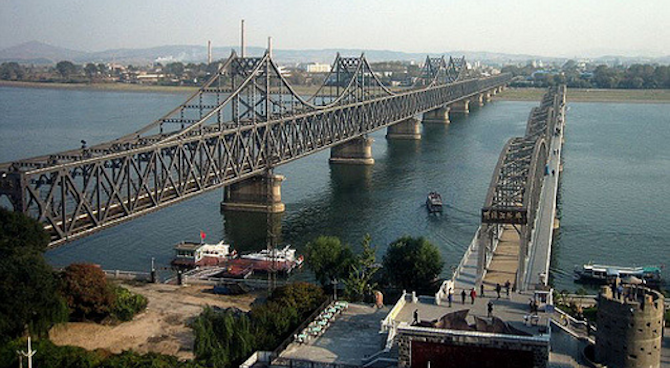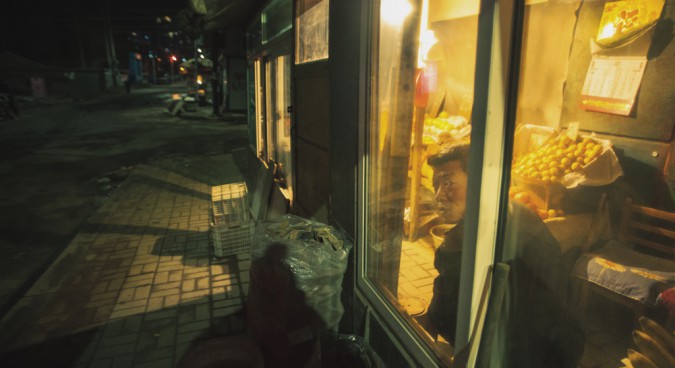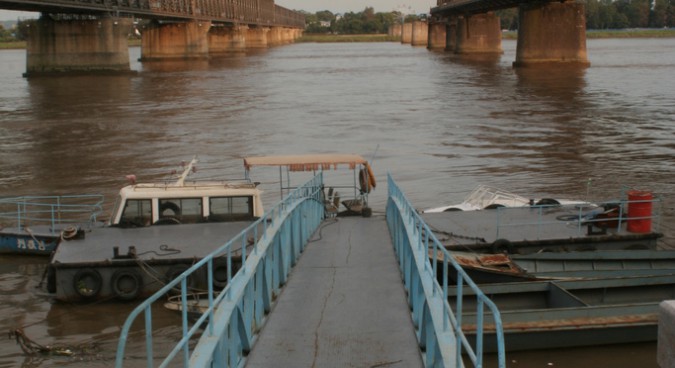
View from the bridge: Signs of change on the N.Korea-China border?
In the border city economic shift is underway - but little appears to change in the DPRK
Usually I go to Dandong once every year or two, but this year was an exception, and in late August, I spent a few days in what is North Korea’s major access point to the outside world. Among other things, it was interesting to learn about what had recently happened in a town that since January has seen a chain of dramatic events, above all, the nuclear test in January and the introduction of the toughest ever sanctions in March.
Of course, all the observations that I am going to share with readers should be taken with a grain of salt: my contacts, overwhelmingly owners of medium-sized businesses, are not in a position to see the big picture and are not privy to state secrets. Nonetheless, they live there and have good reason to know what is going on.
THE MOOD ON THE GROUND
Dandong and its twin city of Sinuiju form the major trade and transport link between North Korea and the outside word. Various estimates indicate that between two-thirds and three-quarters of North Korea’s entire foreign trade pass the old bridge built in 1943 that connects these two cities.
The atmosphere is palpably more tense now. Many people who were willing to meet me last time were reluctant or outright refused to share a table with me.
Dandong can also rival Shenyang in the competition for the title of North Korea’s unofficial foreign trade hub. It’s a place where many (over one hundred) North Korean foreign trade companies operate, making precious hard currency for both the North Korean government and the fast-growing North Korean business elite – the line between the two is often rather blurry nowadays.
So what has changed in the eight or so months since my previous trip there?
The atmosphere is palpably more tense now. Many people who were willing to meet me last time were reluctant or outright refused to share a table with me. North Korean people in the area have started steering clear of potentially dangerous looking contacts, even if such caution is not good for their balance sheet.
A CRACKDOWN
From what I could see, it appears that the Chinese authorities are seemingly quite serious about implementing sanctions under UN Security Council Resolution #2270. Some of my acquaintances who were once involved in the mineral resource trade say that, in recent months, such activities have come to a near complete halt.
Granted, there is some smuggling, but the scale is much smaller than regular, legal trade – which used to sustain quite a few local businesses. Most of the time, it is the expensive resources like iron, zinc, copper or even gold that are smuggled. Some more entrepreneurial types even illicitly move coal as well. For such operations, they use small river ships that can haul 100-200 tons of coal.
Some of my acquaintances who were once involved in the mineral resource trade say that, in recent months, such activities have come to a near complete halt.
The ships, quietly loaded on the North Korean bank, will cross the river in the early hours of the morning and arrive in places where a number of trucks are waiting to rendezvous with them. These river pirates cannot be faulted for their boldness, but it still seems that trade in minerals has largely died – at least, so long far as small and medium sized businesses are concerned.
In some cases, the customs authorities have started to take a harder line in even rather innocuous lines of trade. In one instance, I was told about a Chinese company that has been selling tractors and agricultural equipment to North Korea for decades. In the last couple of years, thanks to the improvement in North Korea’s agriculture, business has been rather brisk, but in the last few months, the company has started to run into a number of issues.
In some cases, the customs authorities have started to take a harder line in even rather innocuous lines of trade.
The authorities believe, or say they believe that tractors and diesel engines are potentially dual-purpose, and thus controlled under sanctions.
This seems to be a rather common situation. Another contact mentioned that a company specializing in sales of the upmarket consumer electronics also ran into similar problems recently. Selling any kind of equipment to North Korea has suddenly become an item of keen interest and scrutiny for China’s mercurial and rather byzantine bureaucracy.
FEELING THE SQUEEZE?
There are different opinions on whether sanctions have started to be felt economically in North Korea. However, seen from Dandong, it appears that it is still largely business as usual in North Korea. Frankly, in the decade or so that I have visited the area, I have never seen so many electric lights on the North Korean side of the river at nighttime. Sinuiju is not exactly bathed with light, but it is not the black hole it once was either.
…seen from Dandong, it appears that it is still largely business as usual in North Korea
What’s more, they’ve even started selling cars and minivans to North Korea – a number of such vehicles are parked in front of the custom offices. A keen observer can tell that they are for North Korean customers because there are special Chinese/Korean bilingual notices that say these vehicles are for export, and there are also nearby shops selling spare parts for said vehicles.
Otherwise, what is being sold has not changed much if compared with a year ago. As per last time, electrical equipment that allows households to survive without reliable electricity from a grid continues to be popular. Small generators, batteries, and above all, solar panels, are sold everywhere.
Some shops even advertise a full set for an electrically self-sustaining household. Such set includes solar panels, generators and batteries, as well as wires and transformers. Household items, too, like kitchen utensils and especially rice cookers are selling very well, as are clothing and shoes.
There are also still a large number of shops with Korean language advertising that sell construction materials, everything from tiles to bricks to wallpaper. However, shops selling computers and DVD players, once ubiquitous, are now few and far between.
PLUS ÇA CHANGE
Imports from North Korea are now dominated by garments and seafood. Most of the seafood comes from North Korea via Sinuiju to Dandong where it is first processed and then sold to cities inside China or overseas, mainly Japan and South Korea). Of course, when sold outside China, the product is not labeled as North Korean produce to avoid potential complications.
However, shops selling computers and DVD players, once ubiquitous, are now few and far between.
It seems that business as usual also continues at the factories employing North Korean workers. Of all Chinese cities, Dandong seemingly has the highest number of North Korean workers – 15-20,000. However, they are not very visible, under constant surveillance and usually not allowed to leave their factories. Groups of workers can only sometimes be seen in markets and shops where they go to buy items necessary for daily life.
North Korean restaurants are still present in large numbers, but they are usually empty nowadays. For the Chinese, these restaurants are seriously overpriced, with meals costing two or even three times the price of the equivalent sold in a Chinese restaurant.
In the past, a significant number of patrons were South Korean tourists, but they are now banned from visiting by both the North and South Korean governments. As most readers surely remember, a few months ago it was reported that North Korean restaurants had banned South Koreans from coming, but it seems that this ban is not universally enforced: I have heard from South Koreans that they have no problems in Beijing or Moscow in such places.
But in Dandong, they are serious about enforcing this ban – to the point of comical.
Indeed, this ban was the reason why I had one of the most bizarre experiences of my life. When I and a friend wanted to enter a North Korean restaurant (for the record, it was the Samchonli restaurant on the river bank and it was late August), we were intercepted by a rather unfriendly looking North Korean waitress who demanded that we produce ID in order to show that we were not South Koreans.
For your information, both my friend and I are rather pale and unmistakenly Caucasian, but we were not allowed in before our passports were carefully checked (a Russian passport created additional trouble because they didn’t know what Cyrillic was).
It remains to be seen what, if anything, will change now, since the new nuclear test will have some impact on the Chinese attitude and, hence, on the city of Dandong.
It is interesting that recently in Dandong, North Korean waitresses have also begun to appear in Chinese-owned restaurants and coffee shops. They work there as contract workers – like North Korean workers who are employed in seafood processing plants or electronics assembly factories.
As usual, Dandong remains the home of a large number of North Korean ‘trade representatives’, many of whom are basically private entrepreneurs in all but name. Recent economic troubles have had some adverse impact on their wellbeing, but people in the know say that established North Korean businesses with enough capital and connections continue to operate with reasonable profits. It is largely the smaller businesses that are suffering under the pressure of sanctions and Chinese crackdowns.
However, an important warning is needed: keep in mind that this was a description of the situation in late August, before the fifth nuclear test. At the time, it was widely expected that China would soon relax its stance on North Korea, annoyed by South Korea’s decision to deploy THAAD anti-missile system.
It remains to be seen what, if anything, will change now, since the new nuclear test will have some impact on the Chinese attitude and, hence, on the city of Dandong.



